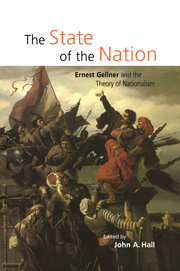Book contents
- Frontmatter
- Contents
- List of contributors
- Introduction
- Part I The making of the theory
- Part II The classical criticisms
- Part III Bringing politics back in
- 7 Nationalisms that bark and nationalisms that bite: Ernest Gellner and the substantiation of nations
- 8 Nationalism and modernity
- 9 Modern multinational democracies: transcending a Gellnerian oxymoron
- Part IV Wider implications
- Bibliography of Ernest Gellner's writings on nationalism
- Index
8 - Nationalism and modernity
Published online by Cambridge University Press: 05 December 2011
- Frontmatter
- Contents
- List of contributors
- Introduction
- Part I The making of the theory
- Part II The classical criticisms
- Part III Bringing politics back in
- 7 Nationalisms that bark and nationalisms that bite: Ernest Gellner and the substantiation of nations
- 8 Nationalism and modernity
- 9 Modern multinational democracies: transcending a Gellnerian oxymoron
- Part IV Wider implications
- Bibliography of Ernest Gellner's writings on nationalism
- Index
Summary
Nationalism is much talked about these days. I suppose it's obvious why. The postcommunist massacres in the ex-Soviet Union and ex-Yugoslavia are reason enough. And suddenly this kind of frightening outburst seems in danger of becoming more the rule than the exception. For some people all this is the more shocking in that it seems like a throwback. We thought we had got past this. The Bosnian savagery comes across to these people as an atavistic return, as though primeval identities, and ageless mutual hatreds were being resurrected at the end of the twentieth century. But this can't be quite the right take on things, because so much in nationalism is quintessentially modern. The Serb-Croat wars disconcert us because they mix an unquestionably modern discourse – self-determination, rule by the people, etc. – with other elements which seem to us alien to (what we understand as) modernity.
Can we hope to understand this? Is there even a ‘this’ to understand here? I mean: is there a single phenomenon? Maybe we're making things even harder for ourselves by assuming that there is something called ‘nationalism’ which is the same wherever people make demands in the name of ethnic/cultural self-determination, so that Bosnian Serbs and Québécois are put in the same category. The differences are explained by the first being more ‘extreme’ than the second; rather on the analogy of: neat whisky knocks you out, but taken diluted makes you mellow.
- Type
- Chapter
- Information
- The State of the NationErnest Gellner and the Theory of Nationalism, pp. 191 - 218Publisher: Cambridge University PressPrint publication year: 1998
- 23
- Cited by

